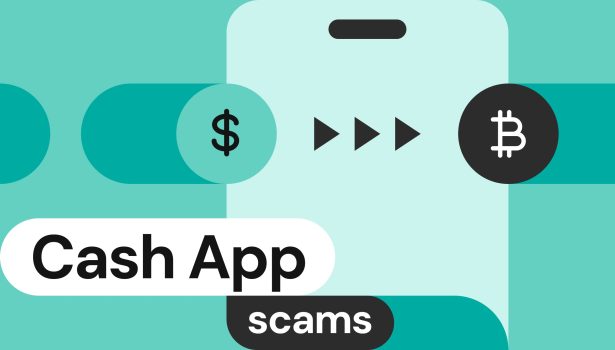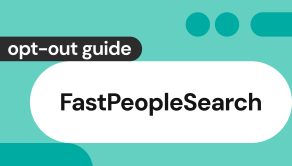Cash App scams: how to spot, avoid, and recover from them

Cash App is a popular U.S.-based financial services app that allows users to instantly send, receive and invest money. It’s appealing to younger audiences and the underbanked, as it enables fast, mostly fee-free money transfers between Cash App users, in some cases even without a bank account.
As it happens, this same simplicity and low entry barrier attracts scammers who seek to exploit inexperienced or unaware users. With scams becoming harder to spot, concerns around security—and questions like “Is Cash App safe?”—are common and often come up for good reason.
Read on to learn how to recognize Cash App scams, nip them in the bud, and protect your funds and personal information from being exploited on Cash App and elsewhere.
8 most common Cash App scams
What makes Cash App scams possible? Just like with other peer-to-peer money transfer competitors such as Venmo and Zelle, it’s really easy to send money or request a payment on Cash App. It takes just someone’s phone number, email or $Cashtag, and there’s minimal identity verification required. Cash App money transfers are instant and can’t be canceled or reversed except in rare cases, so scammers can steal their victims’ money in almost no time.
Here are the top Cash App scam schemes and their common signs so you know what to look out for.
‘Random payment’ or refund scams
A random person might send you money on Cash App “by mistake” and then ask you to refund it.
In reality, scammers use stolen payment card information or hacked Cash App accounts to send out such random money transfers to Cash App users, and then reverse the original payment and redirect refunds to their own accounts. In other instances, they might trick you into believing they sent you a payment with fake payment confirmation screenshots.
How to stay safe: Never respond to refund requests from strangers. If contacted by someone requesting a refund for an accidental money transfer, contact Cash App Support instead. You can also block payment requests from those not in your contacts to stop getting refund requests from scammers.
Cash App bitcoin scams
Since Cash App started offering bitcoin buying and selling via their platform in 2018, bitcoin-owning users became a prime target for scammers.
Scammers track down bitcoin enthusiasts in social media groups, cryptocurrency communities, and comments and reach out with a single goal: to get hold of the user’s bitcoins and vanish.
Bad actors use different tactics in their Cash App bitcoin scams:
- Promising to multiply a certain amount of the user’s bitcoin based on their “insider knowledge,” “trading hacks,” or “glitch in the trading system.”
- Announcing that the person won in a giveaway or is due to receive an unexpected payout, but needs to send some bitcoin first to “cover transaction / processing fees.”
- Using a fake Cash App login page under a false pretense to source the victim’s credentials and steal their bitcoin.
How to stay safe: Only use the official Cash App features to buy, sell, send, or receive bitcoin. Ignore money-flipping or giveaway offers. Remember that you can’t reverse a bitcoin transaction: once you send bitcoin to someone, you can’t get it back.
Fake Cash App screenshots and balances
Fake Cash App screenshots of money transfer confirmations and balances are used in online marketplace scams, “accidental” money transfers, cash flips, phishing, or impersonation scams. In each case, these fake screenshots serve as “proof” when tricking users into believing the payment has come through or that the scammer is an “investor” one can trust.
How to stay safe: Never trust a screenshot, as images can be easily manipulated. Always check your actual Cash App account balance. Never trust strangers who promise to multiply your money or offer anything that sounds too good to be true. If something feels off, report it to Cash App (see the instructions below).
Cash App text scams and support impersonation
One of the most common Cash App scams includes impersonation of Cash App support via text messages, emails, and phone calls.
Scammers may pretend your account has been hacked or that there’s some other problem requiring your immediate attention. They will then direct you to a spoofed page to enter your personal information to “confirm your identity” or for any other convincing reason.
Their only goal here is to collect sensitive details (Cash App password, PIN, sign-in verification code, your SSN, or Cash App Card data) and use them to take over your Cash App account, steal your funds, or even your identity.
In other impersonation scenarios, scammers may ask you to download remote access software to “assist” you with restoring access to your account, send a “test” transaction, or download Cash App again because of “a glitch.”
How to stay safe: Know that real Cash App support reps never ask for PINs, sign-in codes, your full card number, or SSN. They also will never ask you to send a payment, purchase anything or install software—be it downloading Cash App or any third-party application.
Social engineering scams
Scammers don’t limit themselves to impersonating Cash App support. They go further by posing as government agencies, IRS, debt collectors, or even the victim’s friends and family members. In all cases, fraudsters will use scare or urgency tactics to pressure you into acting fast, without giving their claims or requests a second thought.
Their goal here is, again, to collect your sensitive information that they may then use to take out loans in your name, claim public benefits, or access your accounts. They may also ask for money transfers to help your loved one in a dire situation or to prevent any legal action against you.
How to stay safe: Social engineering is psychological manipulation, so the best advice here is to calm down and not act on impulse. Whenever asked to share your personal information, be extra vigilant. Never share PINs, sign-in and verification codes, SSN, payment card information, bitcoin wallet keys, and recovery numbers. Always verify the official contact information of the alleged organization independently.
Cash App scams on Facebook and social media
Since Cash App doesn’t have in-built messaging functionality, scammers use other platforms, such as social media and marketplaces, to lure their victims with all sorts of attractive offers:
- Cash flipping: A scammer will offer to flip a certain sum of money into a much larger amount thanks to their “investment know-how” or some “profitable” scheme they’re part of. They typically start with flipping a small amount to prove their credibility but then request a larger amount and disappear after getting it.
- Loan scams: Scammers make victims believe they are eligible for a fast, easy, and incredibly cheap loan in exchange for some upfront payment or loan application information, typically targeting people in financial need or with low credit scores. In the end, scammers steal either funds or personal information and disappear.
- Catfishing scams: Scammers pose as a romantic interest, developing a close online relationship with the victim, then invent a heart-breaking story explaining why they need money urgently.
How to stay safe: Never trust offers that are too good to be true, such as cheap and easy loans or money flipping. If you suspect a person is a scammer, reverse-search their profile image to see if it’s stolen from another website. Do some background research to verify the person’s profile information is legit.
Fake giveaways
Scammers often advertise free giveaways or sweepstakes in partnership with Cash App, making users believe they’ve won but to claim the prize they need to enter Cash App credentials or make a payment to cover “processing fees.”
How to stay safe: Cash App does run legitimate online sweepstakes, but that only makes fake giveaways all the more believable. If you consider entering any such competition, make sure it’s authorized by Cash App and don’t fall for any offers that come from other sources.
Deposit scams
Facebook Marketplace and other online selling and buying platforms are also popular with scammers who attract victims with fake listings.
Scammers pose as employers, landlords or sellers of pets, concert tickets, or other high-demand or rare items. Once you reach out, they press you to make a deposit to “secure” or “reserve” the job, item, or apartment for you, as there are too many others interested in the listing. Once you comply, they block you and disappear.
How to stay safe: Never pay a deposit for anything you haven’t seen and checked in person. You can check if the listing is real by searching the images used in it and making sure they’re not stolen from other profiles or websites. Remember that getting a job requires no upfront payment—otherwise it’s a scam. If you suspect the seller is fake, verify it via Better Business Bureau.
How to spot a Cash App scam
It takes a trained eye to spot a scam on Cash App or any other online platform, but these skills go a long way, as they can save you from a phishing attack and losing your money.
Let’s review the common signs of a Cash App scam so you know what to watch out for and act accordingly.
Red flags in messages and payment requests
Be cautious if you encounter any of these in DMs, calls, emails, or payment notes:
- Unsolicited offers of easy loans, giveaway prizes, or lucrative investments.
- Messages that use fear tactics or urgency to make you act fast.
- Grammatical errors or unusual spelling in notifications and messages allegedly sent from Cash App.
- Requests from strangers asking for a refund of their “accidental” payment or to send a “test” payment for any reason.
In addition, scammers on Cash App use a variety of phishing techniques to make their messages resemble official communication from Cash App, complete with the company’s logo, branded colors, and email layouts. Verify the sender’s information and make sure it comes from official Cash App channels:
- Official Cash App email domains are @square.com, @squareup.com, @cash.app and @cash.me. You may also receive emails from [email protected] if you have a brokerage account. Anything that’s spelled differently is a spoof.
- The primary Cash App support channels are in-app and by phone. The official Cash App customer support number is (800) 969-1940.
- Official Cash App representatives will never ask for your PIN, sign-in verification code, SSN, or full Cash App Card number. Anyone asking for this information is a scammer.
Fake app interfaces and screenshots
Scammers use forged images of payment confirmations or fake Cash App balance screenshots to make their exploits more convincing:
- They may use edited screenshots showing a sum of money sent to your $Cashtag.
- They may show edited support chat logs “proving” that Cash App “approves” or “authorizes” the transaction.
Only use official sources to download Cash App and access the app, and never click on any links in suspicious messages.
Requests to send money for a “return” later
Never trust messages that promise a quick return on your money or any profit in exchange for an upfront payment. This is a common trick used in cash flipping and giveaway scams, so watch out for requests like:
- “Flip $100 into $1,000 in a day.”
- “Send a $20 deposit to secure [a job, rental, concert ticket, pet, etc.].”
- “Congratulations, you’ve been chosen to win! Just send $5 to claim the prize!”
Remember, easy money is a top sign of a scam. Don’t send funds to anyone promising a bigger return in the future.
What to do if you got scammed on Cash App
If you got scammed on Cash App, act immediately to limit the damage: report the scam to Cash App and local authorities (if applicable), check if you can get your money back, and secure your account and identity to avoid potential scam and fraud attacks going forward.
How to report the scam to Cash App
You can report both the scam and the scammer’s account to Cash App:
- To report an issue with your payment, select the payment in your Activity tab, tap Report an issue, and follow the instructions.
- To report the scammer’s account, tap on their avatar to view their profile, scroll to the bottom, tap Report, and follow the instructions.
You can take a step further and report the scammer everywhere: on social media (if they first contacted you there), to the Federal Trade Commission and the Internet Crime Complaint Center.
Can you get your money back if you were scammed?
How to get money back on Cash App if you were scammed? It’s a popular question, but the answer differs depending on the nature of the transaction.
By default, Cash App transactions can’t be canceled unless you see this option in the payment receipt. However, you can dispute a purchase if it wasn’t authorized by you, that is, if it was carried out without your knowledge or approval.
In case where you gave your money to a scammer willingly, Cash App may deem it a voluntary transaction, which means you’re unlikely to get your money back. Still, reporting such a scam is paramount to stop the scammer in their tracks and prevent them from doing more harm to other users, as their account may be blocked and the funds frozen.
How to protect your Cash App account and identity
If the scammer holds any personal information about you, they may misuse it against you in a Cash App account takeover or identity theft.
Here are the recommended steps to take to protect your account and identity:
- Change your passwords and set up two-factor authentication for your Cash App account and email.
- Enable Secure Lock to verify each Cash App transaction (via PIN, Face ID, or Touch ID).
- Review your recent Cash App activity for signs of any unauthorized transactions.
- If the scammer got hold of your SSN, date of birth or your national ID, report the incident to IdentityTheft.gov.
- Sign up for an identity protection service to monitor any traces of identity theft, including your credit and home title.
- Enable dark web alerts to get notified if your stolen personal information surfaces on the dark web.
Can someone hack your Cash App with your name?
No, it’s impossible to hack a Cash App account with just a user’s name or a $Cashtag. However, having this information makes it easier for scammers to approach you and trick you into revealing more personal information or parting with your funds.
What information puts your Cash App account at risk
Even basic information is enough to target someone in a personalized scam:
- Your full name and $Cashtag can be used for impersonation and money flipping scams that start on social media and then use Cash App for quick, irreversible payments.
- Your phone number can make you a target of a social engineering scam or Cash App support impersonation.
- Your photos or national ID can be used to create fake accounts.
How to minimize your Cash App information exposure
Minimizing the exposure of your Cash App-related information is one of the best ways to protect yourself from such targeted scams. Here are some steps you can take to keep your information as private as possible:
- Don’t reveal your $Cashtag to strangers unless you use the app as a merchant.
- Set your Cash App profile as private so only your contacts can send you payment requests.
- Don’t discuss your Cash App activity publicly on social media or online forums.
- Enable all available protections such as Secure Lock and two-factor authentication to make it harder to access your Cash App account without your authorization.
How Onerep safeguards you from Cash App scammers
If you’ve already suffered from a Cash App scam or want to protect yourself from potential threats, Onerep is your way to reduce your digital footprint and protect your personal information from exposure.
Remove your information from data broker sites
Scammers thrive on publicly available data about their targeted victims. Data broker sites make it easier to source your personal details and use them in highly convincing impersonation or phishing traps.
Use Onerep to remove your personal information from 200+ data brokers and people-search websites and prevent it from reappearing there, automatically.
Reduce ongoing risks of identity theft
Even a basic combination of your full name and home address can be used to steal your identity. Don’t make it easier for fraudsters and remove your sensitive personal details to minimize identity theft risks.
Onerep regularly monitors where your information surfaces online and sends takedown requests on your behalf, so you can have peace of mind knowing this information can’t be used against you.
Start a free scan to see Onerep in action.
FAQs
What do I do if someone sent me money on Cash App and wants it back?
Never refund money to strangers on Cash App without fully verifying their identity and making sure this was indeed by accident. “Accidental” money transfers are a well-known scam scheme used to trick you into refunding money that was initially sent to you using someone’s stolen payment card or hacked Cash App account.
Can I recover funds from a Cash App scam?
In most cases, voluntary transactions (when you send the money to the scammer yourself) are not eligible for recovery. However, you may recover money if it was an unauthorized transaction on your part (for example, if your account was hacked). Report the scam to Cash App and contact their support to discuss your case individually.
How do I verify if a Cash App message is real?
Cash App Support never reaches out via DMs or phone calls. Only trust messages you see in the app itself or sent to you via the official Cash App channels.
Can someone hack me if they know my Cash App name?
No, Cash App accounts can’t be hacked using only a username. Still, this information is frequently used in targeted scams. Treat unsolicited payment requests or money transfers with caution.
What’s the safest way to use Cash App?
Only transact with people you know personally or with contacts whose identity you can verify. Enable all the security controls offered within the app and never share your sensitive information with anyone, even those pretending to be Cash App support.





Dimitri is a tech entrepreneur and founder of Onerep, the first fully automated data removal service. Top cybersecurity CEO of 2021 by The Software Report.